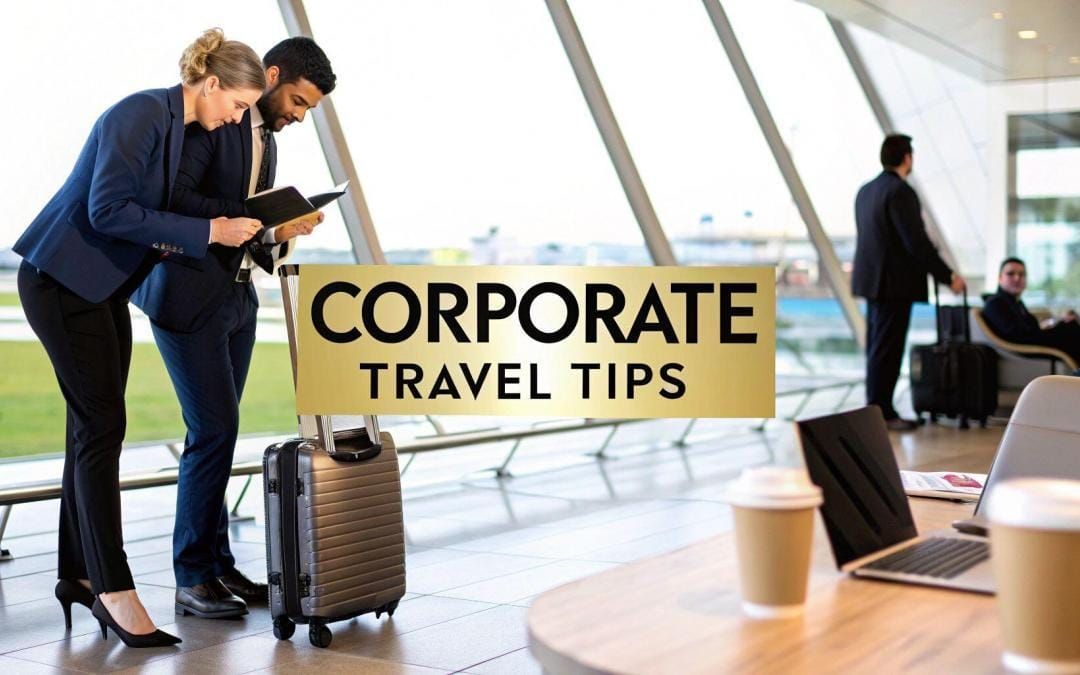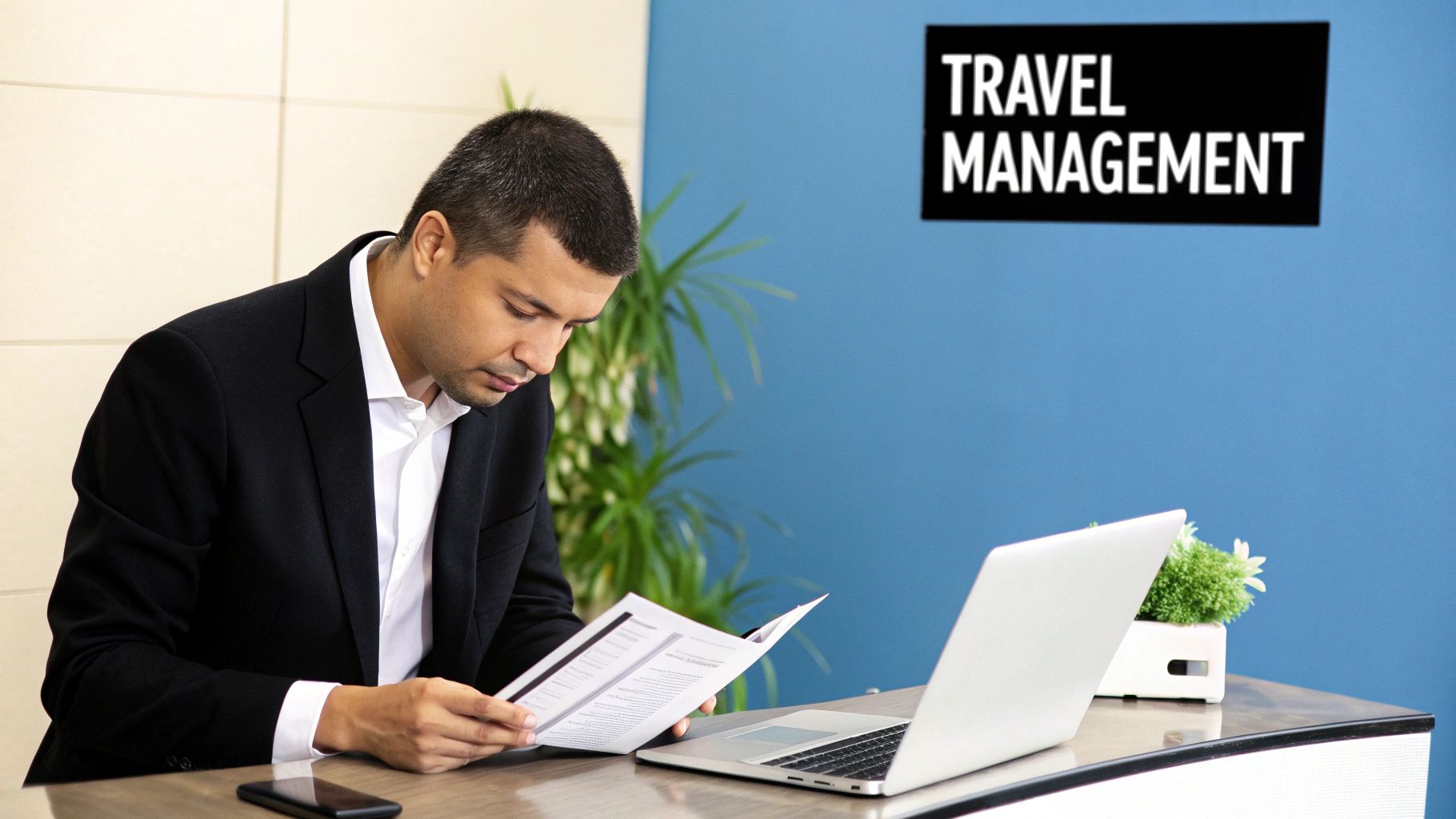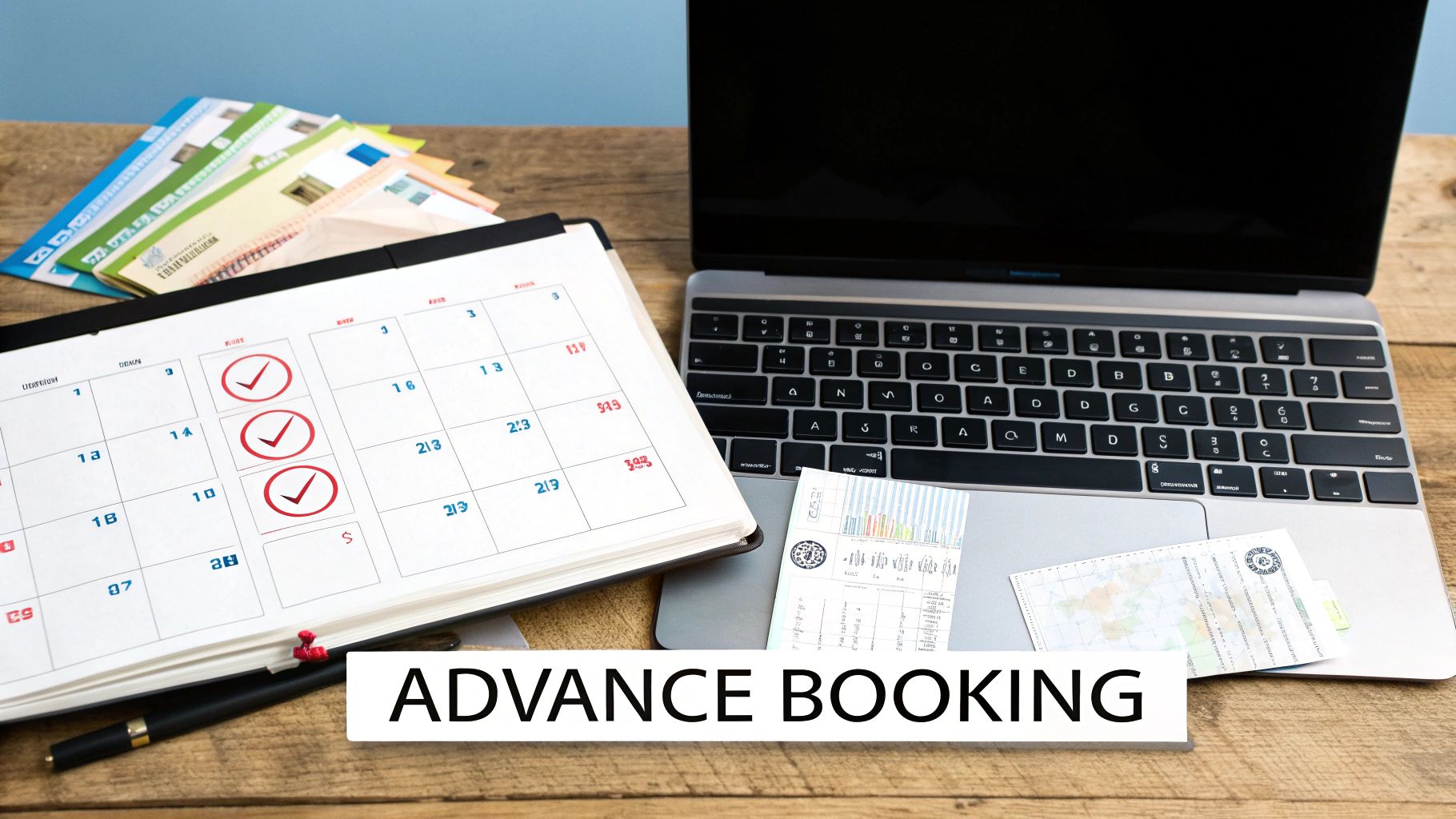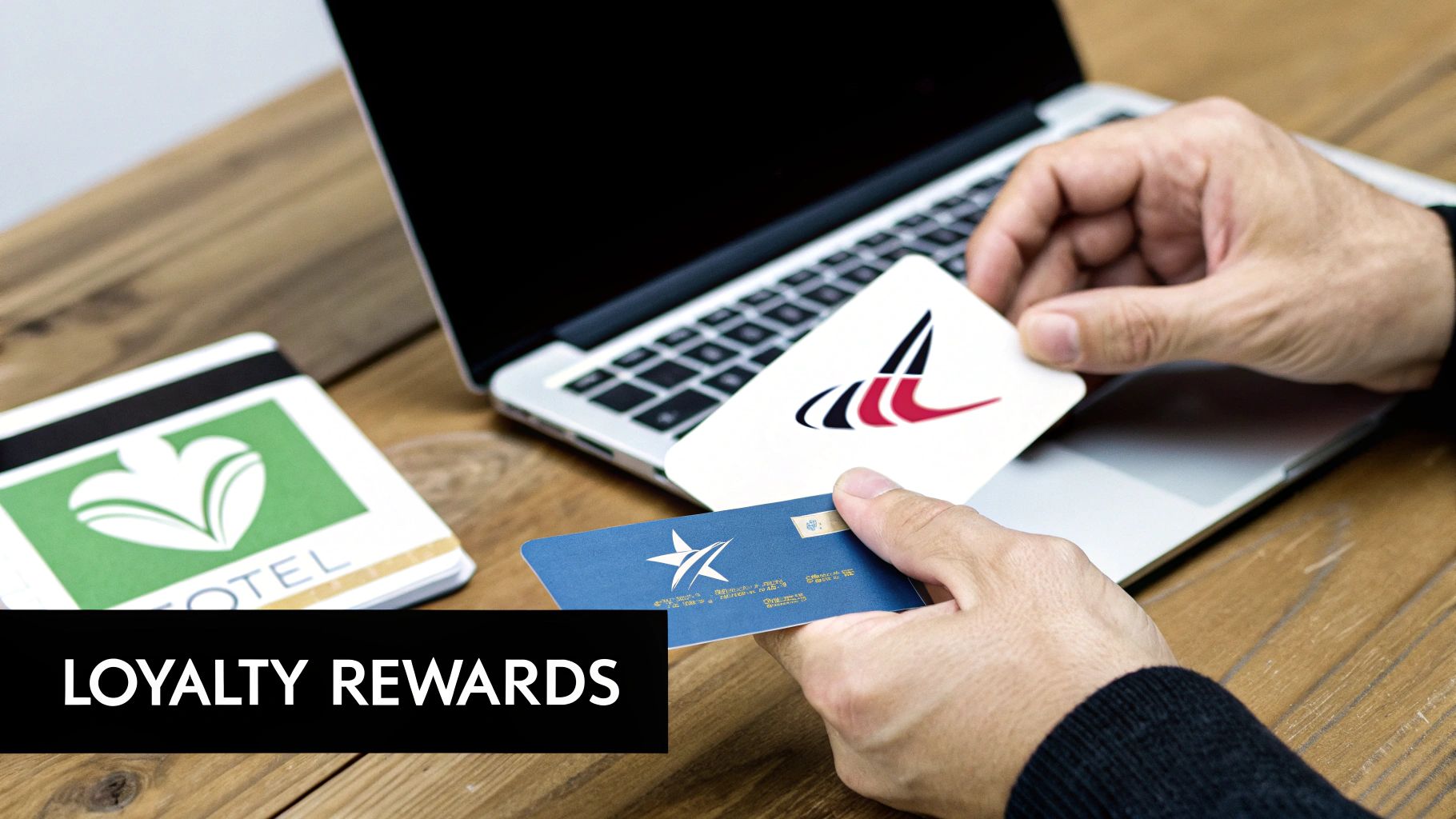Planning corporate travel for a group, whether for a conference, team-building event, or client meeting, involves a complex web of logistics. From coordinating schedules and managing budgets to ensuring traveller safety and comfort, the challenges can quickly become overwhelming for event planners, production crews, and team coordinators alike. Generic advice often falls short, failing to address the nuanced demands of modern business travel, especially when organising transport for multiple people.
This guide moves beyond the obvious, offering seven actionable and strategic corporate travel tips designed specifically for group organisers. We'll delve into leveraging specialised services, optimising policies for cost-efficiency, and embracing technology to transform your travel planning from a logistical headache into a seamless operation. These insights are not surface-level suggestions; they are practical frameworks for improving every aspect of the journey.
By implementing these strategies, you can streamline processes, enhance traveller wellbeing, and achieve significant cost savings. This article provides the tools to ensure your team arrives at their destination focused, refreshed, and ready for business, whether they're attending a major industry expo or a crucial off-site strategy session. We will cover everything from risk management protocols to maximising loyalty program benefits for your entire group.
1. Leverage Corporate Travel Management Companies (TMCs)
For companies managing frequent or complex group travel, partnering with a Corporate Travel Management Company (TMC) is one of the most effective corporate travel tips for achieving efficiency and cost savings. A TMC acts as a specialised agency, handling every facet of your organisation's travel needs, from initial booking and policy enforcement to risk management and 24/7 traveller support. They centralise the entire process, moving you away from disjointed, individual bookings towards a streamlined, strategic programme.
TMCs like American Express Global Business Travel or BCD Travel leverage their immense buying power to negotiate preferential rates with airlines, hotels, and ground transport providers that are inaccessible to individual companies. This includes securing group discounts on flights and arranging coordinated transport, a service that aligns well with specialised providers; for instance, you can read more about options for corporate minibus hire in West London. The result is a significant reduction in your overall travel spend.
How to Implement This Strategy
- Conduct a Thorough RFP Process: Don't just select the first TMC you find. Issue a detailed Request for Proposal (RFP) to several providers. Ask for case studies relevant to your industry and company size.
- Negotiate a Strong Service Level Agreement (SLA): Your SLA should be specific. Define acceptable response times for booking queries, emergency support, and reporting requests. This ensures accountability.
- Prioritise Tech Integration: A key benefit of a TMC is its technology. Ensure their booking platform and reporting tools can seamlessly integrate with your existing expense management and HR systems to automate data flow and simplify reconciliation.
- Establish Clear Communication Protocols: Define clear escalation paths for handling travel disruptions, from a missed flight to a major geopolitical event. Every traveller should know exactly who to contact and what to expect.
By outsourcing the logistical heavy lifting to a TMC, your team can focus on the business objectives of the trip, rather than the complexities of getting there. Their expertise not only saves money but also enhances traveller safety and satisfaction, making them an indispensable partner for any modern business.
2. Implement Dynamic Travel Policy Management
Static, one-size-fits-all travel policies are becoming obsolete. A crucial corporate travel tip for modern businesses is to implement dynamic travel policy management, creating flexible frameworks that adapt to changing business needs, market conditions, and traveller circumstances. This approach moves beyond rigid rules, using technology to balance cost control with employee satisfaction through adjustable guidelines and automated approval workflows, ensuring policies remain relevant and effective.
Leading companies have demonstrated the power of this strategy. For instance, Google's policy offers employees a choice between cost-effective and premium options, empowering them while managing budgets. Similarly, Salesforce's policy dynamically adjusts spending caps and approved vendors based on real-time destination risk levels. Technology platforms like SAP Concur and Expensify are central to this, enabling automated approvals that can, as seen with firms like Deloitte, reduce processing times significantly and provide the data needed for continuous optimisation.
How to Implement This Strategy
- Start Simple and Iterate: Begin with a core set of foundational policies covering essentials like booking windows and spending limits. Gradually introduce more complex, dynamic rules as your organisation gathers more travel data and understands its patterns.
- Leverage Data Analytics: Use your travel and expense data to identify policy gaps and opportunities for improvement. Analyse spending trends, booking behaviours, and policy exceptions to make informed adjustments that refine cost-efficiency.
- Prioritise Clear Communication: When you update or introduce new policies, clear communication is essential. Provide comprehensive training and accessible documentation to ensure all travellers understand the guidelines and the reasoning behind them, which boosts compliance.
- Automate Wherever Possible: Employ a travel management platform to automate pre-trip approvals and policy checks. This not only enforces compliance in real-time but also frees up managers from manual oversight, allowing them to focus on strategic exceptions rather than routine requests.
By adopting a dynamic policy, your company creates an agile and responsive travel programme. This not only controls costs more intelligently but also improves traveller morale by offering greater flexibility and autonomy, making it a cornerstone of effective corporate travel management.
3. Optimize Travel Booking Timing and Advance Planning
A strategic approach to booking corporate travel at optimal times is a cornerstone of effective cost management and one of the most impactful corporate travel tips you can implement. Moving beyond last-minute arrangements to a system of deliberate advance planning allows you to capitalise on lower prices and secure better availability for flights, accommodation, and transport. This involves understanding airline pricing patterns, seasonal demand fluctuations, and embedding advance booking requirements directly into your corporate travel policy.
The financial benefits are substantial. For instance, IBM famously saved an estimated $50 million annually by instituting a 21-day advance booking requirement. Similarly, professional services firms like PwC and Accenture have integrated calendar systems and predictive booking tools to guide employees toward the most cost-effective travel dates, achieving significant savings. This organised approach extends to ground transport, where pre-booking ensures availability and better rates; a topic further explored in guides on how to book airport transfers.
How to Implement This Strategy
- Establish a Clear Advance Booking Policy: Mandate that all non-urgent travel is booked a minimum number of days in advance, typically between 14 to 21 days for flights, to avoid premium last-minute fares.
- Utilise Fare Prediction Technology: Integrate tools like Hopper, Kayak for Business, or Google Travel insights into your booking process. These platforms analyse historical data to forecast whether prices are likely to rise or fall, advising employees on the best time to purchase.
- Create Incentives for Compliance: Encourage adherence by offering small rewards or recognition for employees who consistently book their travel in advance. This fosters a company-wide culture of cost-consciousness.
- Track and Report on Performance: Monitor booking lead times across the organisation. Create reports that highlight the savings achieved through advance planning versus the extra costs incurred from last-minute bookings to demonstrate the policy's value.
By shifting from a reactive to a proactive booking mindset, your company can unlock considerable cost reductions and reduce the stress associated with last-minute travel logistics. It ensures your teams get the best value, allowing budgets to stretch further while guaranteeing smoother, more organised trips.
4. Maximize Loyalty Program Benefits and Consolidation
A strategic approach to corporate travel involves more than just finding the cheapest flight; it means concentrating your company’s spending with preferred vendors to unlock significant value. This is one of the most impactful corporate travel tips for companies of all sizes. By consolidating bookings with specific airlines, hotel chains, and car hire firms, you can leverage your collective buying power to maximise loyalty programme benefits, secure volume-based discounts, and vastly improve the traveller experience through earned status perks.
This strategy works on two levels. Firstly, business-focused programmes like American Airlines Business Extra or Marriott Bonvoy Business reward the company directly with points that can be redeemed for free flights or hotel nights, reducing future travel costs. Secondly, individual travellers still earn their personal frequent flyer miles and hotel points, which leads to higher status tiers, granting them valuable perks like lounge access, complimentary upgrades, and priority boarding. This dual-benefit system enhances employee satisfaction and morale without adding to the company's expenses.
How to Implement This Strategy
- Negotiate Stackable Corporate Rates: When negotiating with suppliers, ensure your corporate rates do not exclude the earning of loyalty points. The ideal agreement allows your company to receive a discounted rate while employees continue to accumulate personal and company-level rewards.
- Automate Profile Enrolment: Integrate loyalty programme enrolment into your employee onboarding process. When a new team member joins, their travel profile should be automatically set up with the company’s preferred vendor accounts, ensuring compliance from day one.
- Track and Report on Value: Use your travel management platform to monitor the value generated from these programmes. Create reports showing savings from redeemed points and the soft value of benefits like upgrades and lounge access to demonstrate the strategy’s ROI.
- Balance Loyalty with Flexibility: While consolidation is key, don’t become completely locked into a single provider if their pricing becomes uncompetitive. Periodically review market rates and maintain a primary and secondary preferred supplier to ensure you always have a cost-effective alternative.
By treating your travel spend as a strategic asset, you can transform it from a simple cost centre into a source of significant savings and enhanced employee welfare. The success of this approach is well-documented, with major firms achieving multi-million-pound savings and dramatically improving travel conditions for their teams through intelligent supplier consolidation.
5. Implement Comprehensive Risk Management and Duty of Care
A company's legal and moral obligation to protect its employees from foreseeable harm is known as Duty of Care, and it is a critical component of any modern corporate travel programme. Implementing a comprehensive risk management strategy moves beyond simple insurance policies; it involves proactively identifying, assessing, and mitigating potential threats to your travellers. This encompasses everything from health crises and political instability to logistical disruptions and personal security incidents, ensuring your team is supported no matter where their business takes them.
Organisations like International SOS and Crisis24 specialise in providing the infrastructure for this. They offer real-time traveller tracking, intelligence alerts, and on-the-ground assistance, transforming your travel policy from a reactive document into a proactive safety net. For example, Shell's sophisticated global travel tracking system successfully manages over 100,000 trips annually, providing instant oversight and support. Similarly, Pfizer's pre-travel COVID-19 risk assessments were credited with preventing unsafe trips and saving the company an estimated £12 million.
How to Implement This Strategy
- Integrate Risk Management with Booking Systems: Partner with a risk management provider whose platform can integrate directly with your TMC or booking tool. This ensures that every trip is automatically registered for tracking and alerts, eliminating manual data entry and potential gaps in coverage.
- Establish Tiered Communication Protocols: Develop clear, escalating communication plans for different risk levels. A minor travel delay might trigger an automated SMS update, while a significant security event should activate a direct call from your response team.
- Conduct Regular Drills and Training: Don't wait for a real crisis to test your procedures. Run regular drills, such as mock evacuations or lost-document scenarios, to ensure both your support team and travellers know their roles and responsibilities. Provide mandatory pre-travel safety briefings and cultural awareness training.
- Monitor and Analyse Risk Data: Use the data from your risk management platform to identify trends and potential hotspots. Analysing incident reports and near-misses provides invaluable insights for refining your corporate travel policy and making future trips even safer.
A robust risk management framework is one of the most vital corporate travel tips because it demonstrates a clear commitment to employee well-being. It not only fulfils your legal duty of care but also builds trust and confidence, empowering your employees to travel and work effectively on a global scale.
6. Leverage Technology for Mobile-First Travel Management
In today's fast-paced business environment, one of the most impactful corporate travel tips is to embrace a mobile-first approach to travel management. This strategy involves using technology platforms that allow employees to book travel, manage itineraries, and file expenses directly from their smartphones. It shifts the focus from desktop-based portals to intuitive, accessible mobile applications, catering to the needs of the modern, on-the-go business traveller.
A mobile-first platform centralises trip details, providing real-time updates on flight changes, gate information, and travel alerts directly to the user's device. This immediate access to information empowers employees, enhances their travel experience, and significantly reduces the administrative burden on travel managers. The success of this model is evident in platforms like Navan (formerly TripActions), which boasts user adoption rates exceeding 90% by prioritising a seamless mobile experience.
How to Implement This Strategy
- Prioritise Platforms with Offline Functionality: When selecting a mobile travel app, ensure it offers robust offline capabilities. Business travellers frequently pass through areas with limited or no internet connectivity, especially during international trips. The ability to access itineraries, booking confirmations, and contact details without a connection is essential.
- Implement Single Sign-On (SSO): Reduce friction and enhance security by choosing a platform that integrates with your company's existing Single Sign-On solution. SSO allows employees to log in using their standard corporate credentials, eliminating the need to remember another password and streamlining the onboarding process.
- Ensure Seamless Systems Integration: Your chosen mobile platform must integrate smoothly with your company's other core systems, particularly expense management and HR software. This automates the flow of data, from booking to reconciliation, which prevents manual data entry errors and simplifies reporting for your finance team.
- Provide Comprehensive Mobile Training: While modern apps are often intuitive, do not assume universal adoption. Organise brief training sessions or create simple video tutorials demonstrating key features, such as booking within policy, accessing support, and submitting expenses on the go. This ensures everyone can leverage the technology effectively.
By placing powerful travel management tools directly into your employees' hands, you foster a culture of autonomy and efficiency. This approach not only improves traveller satisfaction but also provides your organisation with real-time data and control, making it an indispensable strategy for managing corporate travel effectively.
7. Develop Sustainable Travel Practices and Carbon Management
Integrating sustainability into your corporate travel programme is no longer a peripheral concern but a central pillar of responsible business operations. Developing sustainable travel practices involves creating and enforcing policies that minimise environmental impact while still meeting business objectives. This strategy goes beyond simple suggestions, requiring a structured approach to tracking, reducing, and offsetting the carbon footprint associated with every business trip. It repositions corporate travel as an opportunity to demonstrate environmental stewardship and align with company values.
This forward-thinking approach is exemplified by companies like Patagonia, which has long offset 100% of its business travel emissions, and Microsoft, which has an ambitious programme to be carbon negative. These initiatives show that profitability and sustainability can coexist. The core idea is to shift from a default "fly everywhere" mentality to a more considered, multi-modal, and digitally-enabled approach. For instance, choosing group transport, such as a coach, for team outings or regional meetings can significantly lower per-person emissions compared to individual car journeys. This is a practical consideration for planners organising corporate days out.
How to Implement This Strategy
- Establish a Clear Sustainability Policy: Define specific, measurable goals. This could include a target for reducing overall travel emissions by a certain percentage or mandating train travel for journeys under a specific duration. Start with achievable wins to build momentum.
- Implement Carbon Tracking and Reporting: You cannot manage what you do not measure. Use tools or partner with your TMC to track the carbon footprint of all flights, hotel stays, and ground transport. Regularly report on progress towards your sustainability targets to create accountability.
- Promote and Incentivise Greener Choices: Actively encourage employees to select lower-carbon options. This can be achieved through your online booking tool by flagging "green" hotels or prioritising rail travel in search results. Communicate the positive impact of these choices to foster a culture of sustainability.
- Invest in High-Quality Carbon Offsets: For unavoidable emissions, establish a programme to invest in credible carbon offset projects. Partner with organisations that support verified schemes, such as those certified by Gold Standard or Verra, to ensure your contributions make a genuine impact.
By embedding sustainability into your travel framework, you not only reduce your environmental impact but also enhance your corporate reputation and appeal to an increasingly eco-conscious workforce. It is a strategic move that delivers value across financial, environmental, and cultural dimensions.
7 Key Corporate Travel Strategies Compared
| Strategy | Implementation Complexity 🔄 | Resource Requirements ⚡ | Expected Outcomes 📊 | Ideal Use Cases 💡 | Key Advantages ⭐ |
|---|---|---|---|---|---|
| Leverage Corporate Travel Management Companies (TMCs) | Medium – requires integration and training | Moderate – service fees and vendor reliance | High – cost savings, policy compliance, reporting | Organizations needing centralized travel management | Cost savings, 24/7 support, risk management |
| Implement Dynamic Travel Policy Management | High – needs sophisticated tech and setup | High – investment in technology and training | High – better compliance, cost control, faster approvals | Companies with evolving travel needs and data focus | Improved compliance, employee satisfaction |
| Optimize Travel Booking Timing and Advance Planning | Medium – process changes and discipline | Low to Moderate – tools for tracking and reminders | Medium – cost savings, better availability, less stress | Firms with predictable travel schedules | Significant savings, better planning accuracy |
| Maximize Loyalty Program Benefits and Consolidation | Medium – ongoing program and vendor management | Moderate – program administration and negotiation | Medium to High – cost reduction, enhanced traveler experience | Companies with high travel volumes | Discounts, elite traveler perks, streamlined processes |
| Implement Comprehensive Risk Management and Duty of Care | High – complex systems and protocols | High – tracking, alerts, insurance costs | High – enhanced safety, legal risk reduction, crisis response | Organizations with global or high-risk travel | Employee safety, liability reduction, crisis management |
| Leverage Technology for Mobile-First Travel Management | Medium – app deployment and integration | Moderate – mobile platform costs and support | High – real-time updates, better data, user satisfaction | Mobile-driven workforce needing on-the-go access | User adoption, real-time expense reporting |
| Develop Sustainable Travel Practices and Carbon Management | High – measurement and policy enforcement | Moderate to High – sustainable options and reporting | Medium – reduced footprint, CSR improvements | Companies committed to environmental responsibility | Environmental impact reduction, employee engagement |
Making Your Next Corporate Trip a Strategic Success
Navigating the complexities of corporate travel can often feel like a juggling act, balancing budgets, employee wellbeing, and strategic business goals. However, as we have explored, a proactive and structured approach can transform this challenge into a significant competitive advantage. The journey from logistical headache to streamlined success is paved with a series of deliberate, intelligent choices. These aren't just minor adjustments; they are foundational shifts in how your organisation perceives and manages business travel.
By moving beyond mere booking and embracing a holistic strategy, you empower your team and protect your bottom line. The key takeaways from our deep dive into corporate travel tips revolve around creating a cohesive ecosystem. This means integrating a skilled Travel Management Company (TMC), implementing flexible yet firm travel policies, and leveraging technology not just for convenience but for data-driven insights. It’s about being smart with your resources, from optimising booking windows to consolidating loyalty programmes for maximum return.
From Theory to Action: Your Strategic Roadmap
The true value of these insights lies in their application. Mastering corporate travel is an ongoing process of refinement, not a one-time fix. Here are the pivotal actions to prioritise:
- Audit and Align: Begin by reviewing your current travel practices against the principles we've discussed. Where are the gaps? Are your policies dynamic enough to handle modern travel demands? Is your duty of care protocol robust and clearly communicated?
- Embrace Technology: If you haven’t already, invest in a mobile-first travel management platform. Empowering your travellers with real-time information, itinerary management, and instant support channels is non-negotiable in today's environment.
- Prioritise People and Planet: A successful travel programme is one that your employees appreciate and that reflects your company's values. Integrating comprehensive risk management demonstrates you care for their safety, while adopting sustainable practices shows a commitment to broader corporate responsibility. This combination builds trust and enhances your employer brand.
Ultimately, a world-class travel programme is a powerful enabler of business. It ensures your people arrive at their destinations prepared, safe, and focused on the mission at hand, not bogged down by logistical friction. By implementing these advanced corporate travel tips, you are not just cutting costs; you are investing in productivity, employee satisfaction, and the overall strategic success of your organisation. Every well-planned trip becomes a seamless extension of your business operations, driving growth and fostering a positive corporate culture.
Ready to streamline the ground transport for your next corporate event or business trip? Let West London Minibus Hire manage the logistics with our professional, reliable, and comfortable minibus services, ensuring your team travels together and arrives on schedule. Visit us at West London Minibus Hire to get a quote and simplify your group travel planning today.




